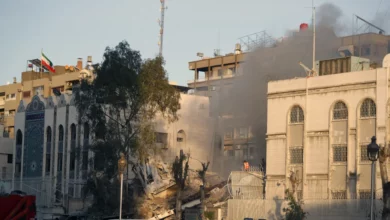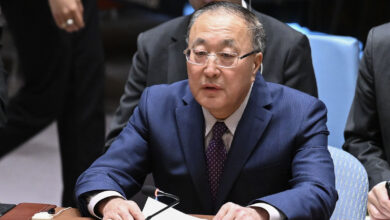Damascus — Hossam looked on the protest scene with excitement and giddy anticipation. A few hundred defiant Syrians had taken to the streets of Jdeideh Artooz, a scruffy little town of a few thousand people located 15km west of the capital Damascus, to demand the ouster of Syrian President Bashar al-Assad.
"I'm going to go out and take some photos," the young man in his early 20s said breathlessly.
Despite the modest turnout, the demonstration, held on 30 April, was nothing short of a political earthquake for a town such as Jdeideh.
"There was a demonstration here last week," said Hossam. "But this is much bigger. I can't believe this is happening here."
Syria, one of the most tightly controlled Arab nations, has been racked by brutal violence, mass raids targeting political dissidents, and widespread demonstrations in recent days and weeks. On Friday, Syrian forces killed 62 protesters throughout the country in an attempt to quell the ever-growing protest wave. And rights groups are reporting one thousand arrests since Saturday, primarily in Deraa, the southern town at the epicenter of Syria’s paralyzing unrest.
The death toll over the past seven weeks has now topped 550. And the pro-democracy movement shows no signs of relenting. This weekend saw an unprecedented number of protesters take to Syria’s streets.
Just a few months ago, calling publicly for the collapse of Syria's decades-old Baathist regime would have been a gravely serious offense. For decades Syrians have labored under crippling fear of Syria's security apparatus.
The ruthless regime of Hafez al-Assad, father of current leader Bashar, did not tolerate dissent. He banned opposition parties and muzzled the press. During the infamous Hama massacre of 1982, Syrian forces launched a bloodbath on Syria’s third largest city, claiming 10,000-20,000 lives in a crackdown on a Muslim Brotherhood uprising. The massacre left an indelible mark on the Syrian national psyche.
Assad and his closely affiliated security apparatus have, thus far, shown no indication they intend to scale back the brutal methods they’ve employed to crush Syria’s dissent. Analysts continue to speculate over the development of rifts within the president’s inner circle but little reliable information concerning a potential change in leadership has emerged.
Marina Ottaway, Middle East director at the Washington-based Carnegie Endowment for International Peace, says Bashar has formed his own identity, one with a predilection for suppression, since ascending to power 11 years ago. The president, Ottaway says, should no longer be viewed in his father’s looming shadow.
“You can no longer say that he is controlled by his father’s associates," said Ottaway. "He is now surrounded by his people and the interest of those around him is obviously the perpetuation of the regime. “
Some have speculated Assad is now trying to implement a "Hama solution" in Deraa. Despite talk of fragmentation in the country’s highest echelons of power, Syria is no Egypt or Tunisia. Alawites, the minority sect to which the Assad family belongs, comprise the leadership positions of the most powerful security and army branches. As their fates are arguably fastened with that of Bashar’s, they are unlikely to embrace a transition to pluralist rule if it includes Assad’s abdication.
“The interest of those around him is obviously the perpetuation of the regime,” said Ottoway. “If Bashar goes, his close associate go as well, losing their political and economic perks and, worse, opening themselves to prosecution. See what is happening in Egypt.”
According to Radwan Ziadeh, a Syrian based in the US who is heavily involved in monitoring the current crisis, the regime will fail if it simply reverts to past methods of repression. Syria in 2011, according to Ziadeh, is not the same country as Syria in 1982.
"They are using the same tactics as in the 1980s — huge numbers of people arrested at random in an attempt to increase the fear of the population,” said Ziadeh. "But they don't know that the situation is different compared to the 1980s. The protests are not in one or two cities, they are in more than 80 cities and towns across the country.”
"The international community has also been quick to condemn this response, unlike in the eighties, and the role of social media is important. The people cannot be controlled anymore.”
Over the coming weeks and months the world will see whether Syria follows the path of Egypt and Tunisia, or descends into a bloody, fratricidal morass like the current situation in Libya. Some analysts speculate the latter appears more likely.




